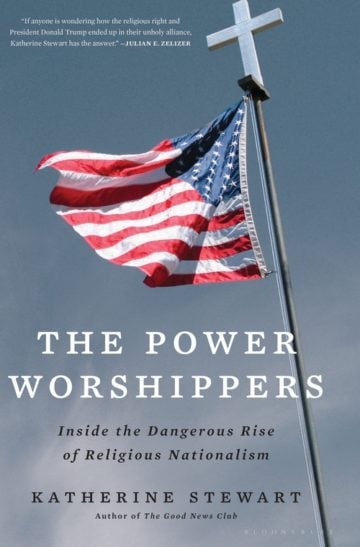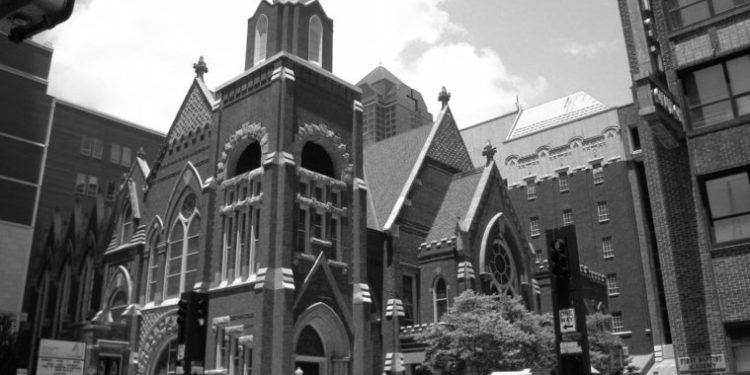After Hurricane Harvey devastated the Texas coast in 2017, three affected churches sued FEMA, claiming the agency’s policy against providing relief funds to religious organizations was discriminatory. The matter was resolved when a pressure campaign by political figures associated with the religious right—including Texas Governor Greg Abbott and Attorney General Ken Paxton—resulted in the agency allowing direct funding of churches. By itself, the case may not seem very significant. But as journalist Katherine Stewart reports in The Power Worshippers: Inside the Dangerous Rise of the Religious Right, it arose from a disturbing context: the decades-old, well-organized, amply funded political effort to institute a conservative Christian theocracy in the United States.
As Stewart shows how the evangelical Christian church came to dominate politics, the alarm she raises can be neither ignored nor dismissed as conspiracy-mongering. She makes clear that Christian nationalists’ reach into current power structures—including Trump’s White House—demands urgency from those who would protect church-state separation. As November’s election looms, The Power Worshippers is a timely political exposé, indispensable reading for 2020 voters regardless of their religious beliefs.
Stewart devotes each chapter to a different topic, using a first-person reporting style to guide readers through a complex network of pastors, power brokers, politicians, think tanks, data miners, attorneys, billionaires, and those persuaded by all of the above to vote according to “biblical values.”

by Katherine Stewart
Bloomsbury
$19.60; 352 pages
Buy the book here.
With more than a decade of experience covering conservative Christianity, Stewart is adept at conveying the gravity of its aims. She goes deeper than any facile culture-wars discourse, digging into the evangelical right’s fervor to gain political power and privilege in the name of religious liberty. The movement, Stewart writes, “does not seek to add another voice to America’s pluralistic democracy but to replace our foundational democratic principles and institutions with a state grounded on a particular version of Christianity.” (The relatively vague phrase “religious nationalism” is an odd choice for the book’s subtitle, since Stewart focuses exclusively on Christians.)
The movement’s zealots—including First Baptist Church of Dallas pastor and Trump insider Robert Jeffress—insist, despite history, that the United States was founded as a Christian nation. Going further, they claim the country has fallen and must realign with their fundamentalist version of the faith to thrive again. They dismiss the principle of church-state separation as secular oppression and assert that God wants them to have dominion (another name for the movement is dominionism) over every aspect of culture, society, and government. They would use that power to infuse governance with their theology; bias the courts to solidify their privilege; enforce patriarchal, heteronormative gender and sexual ideology; promote creationism and otherwise denigrate science; eradicate the public school system; and end abortion.
Stewart’s chapter on the history of Christian nationalism is particularly well done, revealing the unsavory past of a movement that presents itself as morally superior. She traces the current Christian right’s origins from reactionary, 19th century pro-slavery theologians to modern incarnations such as R.J. Rushdoony, the creator of a version of religious nationalism he called Christian Reconstruction. Rushdoony’s message influenced presidential candidate Ronald Reagan’s 1980 address to religious activists in Dallas, a milestone in his campaign. Months later, Stewart reports, Rushdoony visited Reagan in the White House to lobby for churches to remain tax exempt even when they operated whites-only private schools.
Such unflattering truths do not reflect what Christian nationalists want to believe, so they must create their own history. Enter David Barton, an Aledo, Texas-based former vice chair of the state GOP and pseudohistorian celebrated on the religious right for his revision of facts in service of the false narrative of “America’s Christian founding.” Stewart describes Barton’s influence—including on the Green family, the conservative Christian owners of Hobby Lobby and founders of the Museum of the Bible in Washington, D.C.—while showing how thoroughly his claims have been debunked. (In 2012, Barton’s book The Jefferson Lies was retracted by Christian publishing house Thomas Nelson, which cited its numerous factual inaccuracies.)
Stewart also has a knack for untangling Christian nationalists’ cynical legal strategies, which have been among its most successful gambits. She briefly recounts the subject of her first book, The Good News Club: The Christian Right’s Stealth Assault on America’s Children. It concerns a Supreme Court decision ruling that religious exercise—in this case, using public school facilities to proselytize to young children—is no different from any other free speech. In Good News Club v. Milford Central School, the court ruled that when the government creates a free speech forum, as when a public school allows civic groups to use its facilities, it cannot discriminate based on viewpoint, including religious beliefs. That created de facto government subsidy of religious practice, which further court cases have expanded. At this writing, the U.S. Supreme Court has heard arguments but not yet ruled in Espinoza v. Montana Department of Revenue, a case with the potential to permanently legalize taxpayer funding of religious schools.
The book unpacks much more, so much that I found myself wishing for a cast-of-characters list or flowchart to help me keep track, and the effect is overwhelming. The Christian nationalist political machine is so influential, and its adherents so impassioned, that its rise can seem inevitable. But Stewart offers encouragement in the epilogue, stressing that overcoming such reactionary, authoritarian movements has made Americans what we are.
The struggle is about deciding what kind of nation the United States will become, she writes in an earlier chapter. “Are we a nation in which one brand of religion enjoys a place of privilege? Are we a nation of laws—except in cases where the law offends the feelings of those who subscribe to our preferred religion? Will we recognize the equal dignity of all of our citizens? Or are we the kind of society that heaps contempt upon those groups that our national religion happens to despise?”
Read more from the Observer:
Credit: Source link


